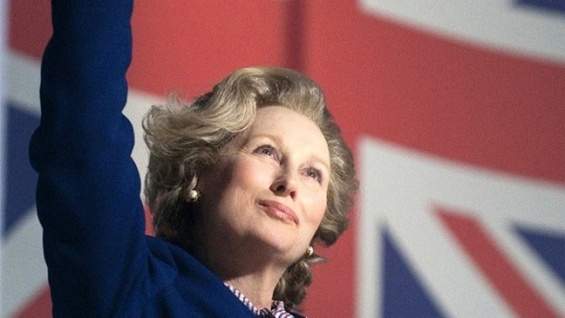The Iron Lady
Meryl Streep mesmerises in her portrayal of Britain's groundbreaking but controversial leader.
Overview
In January 2007, Joe Klein wrote a fascinating Time piece on Hilary Clinton, noting: “she is prohibitively rational and unclouded by undue emotionality….She doesn't feel your pain; she understands it. Rationality breeds caution, and caution breeds a lack of spontaneity which can make her seem cold and calculating.” Given Clinton was on the cusp of becoming the first viable female candidate for President it’s more than likely a few people read Klein’s piece and found his characterisation eerily reminiscent of the famously phlegmatic Margaret Thatcher – perhaps the most divisive (and derided) western political figure of the modern age.
‘Cold and calculating’ is a sadly familiar description of women in higher political office, just as it’s a characteristic unfairly applied since the same quality in men is so often deemed ‘Presidential’. For screenwriter Abi Morgan, however, such unsentimental obstinacy represented the ideal cornerstone for her Thatcher biopic, The Iron Lady. The key scene occurs about an hour into the movie. Here we find an elderly Thatcher chiding her physician for simply asking her how she feels, saying: “One of the great problems of our age is that we are governed by people who care more about feelings than they do about thoughts and ideas.” Such is the Thatcher that Morgan chose to present: stubborn, principled and proudly unsentimental. Indeed, the film’s title takes its name from the sobriquet given to Thatcher by the Soviet media due to her unwavering opposition to communism, and director Phyllida Lloyd (Mama Mia) gleefully indulges. Thatcher was a thinker, not a feeler, and her eleven-year tenure as Prime Minister wholly reflected that.
Meryl Streep is quite simply phenomenal in the lead, with her dual portrayal of Thatcher, both as a grandmother slipping into Alzheimer’s and as her younger self entering (then commanding) parliament, utterly captivating. Her performance certainly outshines the film on a whole, which sadly only presents a broad strokes review of Thatcher’s life rather than focusing on just a few key moments and exploring them more rigorously. It’s a sort of ‘Thatcher sans Thatcherism’ approach that regrettably robs audiences of the kind of in-depth character analysis they might have been hoping for. In particular, Lloyd provides only scant mention of the infamous miner’s strike that forever soured Thatcher’s image for millions of Britons, and almost all of her defining moments are presented in a distinctly feminist light such that even the Falklands War somehow comes across as a story about an audacious women taking on the status quo.
Despite its failings, The Iron Lady remains a fascinating film about an extraordinary woman (regardless of one’s feelings towards her) and offers a sublime showcase of Meryl Streep’s astonishing abilities that already have her odds-on favourite for the 2012 Academy Award.





